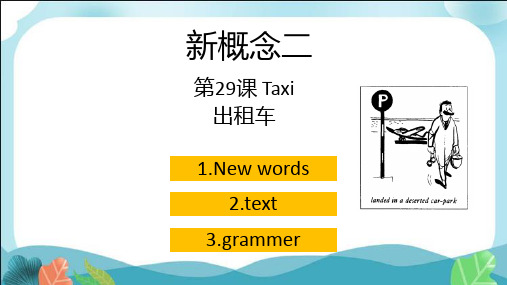(完整版)新概念第二册29课课件
合集下载
新概念2精品课件Lesson29

关于:不完全比较
1 To do the research for my term paper, I read books more than searching the Web. 改: To do the research for my term paper, I read books more than I searched the Web.
练习: 3 In the Great Gatsby, I disliked Daisy as much as Tom. 改:Idisliked D as much as I disliked T. I disliked D as much as T did.
4 Allen's canoe was destroyed in the rapids. Just like his partner. 改:Allen's canoe was destroyed in the rapids. Just like his partner's was.
2 Mini visited her aged aunt longer than Kathy. 改:Mini visited her aged aunt longer than Kathy did. Mini visited her aged aunt longer than she visited Kathy.
在不定式之前及介词之后 1/ She doesn't know whether to get married now or wait. 2/ Everything depends on whether we have enough money
语法链接
关于主语从句的主谓一致 一般都用单数 What I am interested in is horror movies. Whatever he says is of no importance. That he is late for class is certain.
新概念英语2第29课

– dangerous
Free Talk
❖How often do you take a taxi?
❖What is the advantage(优 势) or disadvantage of taking a taxi?
New words
❖ Taxi出租汽车 ❖Pilatus Porter皮勒特斯.波特 ❖ Land着陆 ❖ Plough耕地 ❖ Lonely偏僻的,人迹罕至的 ❖ Welsh威尔士的 ❖ Roof楼顶 ❖ Block一座大楼 ❖ Flat公寓房 ❖ Desert废弃
Grammar focus
❖ 现在完成时 & 一般过去时 中时间状语的比较 1. 现在完成时的时间状语多表示到现在为止的这段时
间:since+某一时间,for+一段时间,up till now, just, before等。 2. 一般过去时表示过去某时发生的动作,时间状语多 为last year (month), ago (3 years ago), in + 某一年,just now等。 ❖ I saw him in 1994. I haven’t seen him since 1994. ❖ I saw him 3 years ago. I haven’t seen him for 3 years.
taxi
n. 出租车 他给我叫了辆出租车。
❖He called a taxi for me. 乘出租车
❖by taxi ❖ 出租车司机 ❖taxi driver ❖take a taxi to … 打车去… ❖ eg:他每天早上打车上学。
He takes a taxi to school every morning.
land
Free Talk
❖How often do you take a taxi?
❖What is the advantage(优 势) or disadvantage of taking a taxi?
New words
❖ Taxi出租汽车 ❖Pilatus Porter皮勒特斯.波特 ❖ Land着陆 ❖ Plough耕地 ❖ Lonely偏僻的,人迹罕至的 ❖ Welsh威尔士的 ❖ Roof楼顶 ❖ Block一座大楼 ❖ Flat公寓房 ❖ Desert废弃
Grammar focus
❖ 现在完成时 & 一般过去时 中时间状语的比较 1. 现在完成时的时间状语多表示到现在为止的这段时
间:since+某一时间,for+一段时间,up till now, just, before等。 2. 一般过去时表示过去某时发生的动作,时间状语多 为last year (month), ago (3 years ago), in + 某一年,just now等。 ❖ I saw him in 1994. I haven’t seen him since 1994. ❖ I saw him 3 years ago. I haven’t seen him for 3 years.
taxi
n. 出租车 他给我叫了辆出租车。
❖He called a taxi for me. 乘出租车
❖by taxi ❖ 出租车司机 ❖taxi driver ❖take a taxi to … 打车去… ❖ eg:他每天早上打车上学。
He takes a taxi to school every morning.
land
新概念二-第29课课件

课文注释
4. …Captain Fawcett has flown passengers to many unusual places .……弗西特机长已经载送乘客到过许多不寻常的地方。 我们已经学过fly作为不及物动词的用法,其意义为“飞”、“飞行”: The aeroplane is flying over the river. 飞机正从河上飞过。 在本课中,fly为及物动词,意思为“空运(乘客)”: He has flown his car to France. 他已将他的汽车空运到法国。
text
熟读课文:
Captain Ben Fawcett has bought an unusual taxi and has begun a new service. The taxi is a small Swiss aeroplane called a Pilatus Porter’.This wonderful plane can carry seven passengers.The most surprising thing about it, however, is that it can land anywhere:on snow,water,or even on a ploughed field.Captain Fawcetts first passenger was a doctor who flew from Birmingham to a lonely village in the Welsh mountains.Since then,Captain Fawcett has flown passengers to many unusual places.Once he landed on the roof of a block of flats and on another occasion he landed in a deserted car park.Captain Fawcett has just refused a strange request from a businessman.The man wanted to fly to Rockall a lonely island in the Atlantic Ocean, but Captain Fawcett did not take him because the trip was too dangerous.
新概念2_Lesson29(共18张PPT)

plough (one's way) through sth (a) force a way through sth 费力穿过某处
The ship ploughed through the waves. 那轮船破浪前进.
Field range of a subject, an activity or an interest (某种学科﹑ 活动或兴趣的)领域, 范围, 界: 在政治﹑ 艺术﹑ 科学﹑ 音乐等领域
公寓) office block办公楼写字楼
desert v. 废弃 ①[Tn] (a) go away from (a place) without intending
ever to return 离弃(一地方); 放弃; 遗弃: 离弃一所房屋﹑ 一座城市等
desert a house, city, etc
这个人想要飞往大西洋上的一个孤岛--罗卡尔岛, 弗西特机长 之所以不送他去, 是因为那段飞行太危险了.
take sb. to …送某人……
Very and Too very adv. 很,非常(very描述状况,不涉及后果) very expensive很贵,但买得起
I arrived very late but I caught the train.
I offered to pay him for his help but he refused (payment). deny doing sth. / deny that +从句否认(指控、做过某事等) 秘书不承认她偷了那封信。
The secretary denies that she has stolen the letter. 当refuse作为及物/不及物动词表示“拒绝接受”时,不可与
The ship ploughed through the waves. 那轮船破浪前进.
Field range of a subject, an activity or an interest (某种学科﹑ 活动或兴趣的)领域, 范围, 界: 在政治﹑ 艺术﹑ 科学﹑ 音乐等领域
公寓) office block办公楼写字楼
desert v. 废弃 ①[Tn] (a) go away from (a place) without intending
ever to return 离弃(一地方); 放弃; 遗弃: 离弃一所房屋﹑ 一座城市等
desert a house, city, etc
这个人想要飞往大西洋上的一个孤岛--罗卡尔岛, 弗西特机长 之所以不送他去, 是因为那段飞行太危险了.
take sb. to …送某人……
Very and Too very adv. 很,非常(very描述状况,不涉及后果) very expensive很贵,但买得起
I arrived very late but I caught the train.
I offered to pay him for his help but he refused (payment). deny doing sth. / deny that +从句否认(指控、做过某事等) 秘书不承认她偷了那封信。
The secretary denies that she has stolen the letter. 当refuse作为及物/不及物动词表示“拒绝接受”时,不可与
新概念英语Lesson29-30(共8页)课件

the room. • MRS. JONES: Then put these clothes in
the wardrobe. • MRS. JONES: Then make the bed. • MRS. JONES: Dust the dressing table.
课文解析
• e in ,Amy. 进来,艾米! • ★祈使句:省略了主语“you”动词用原
形。 • 用来表示直接的命令,建议,告戒或邀请
等多种意图。 • e.g.: Stand up! • Sit down! • Give me some glasses,please. • Harry up ,shut the door! • Open the window and air the room. • Go away!
• 该句仍为祈使句。 • put sth. Somehwhere句型 • put the apple in my bag • put money in my bag • put the stone in your bag • put the computer in my room • put the T.V. in my room • put the dust bin in your room
• 2.What must I do? 我必须做些什么呢? • 这是本课所学的含有情态动词的特殊疑问
句。 • 其结构为:特殊疑问词+情态动词+主语+
谓语?
• What must I do?
• What must he do?
• What must they do?
• 3.Then put these clothes in the wardrobe. 然后把这些衣服放在衣柜里。
the wardrobe. • MRS. JONES: Then make the bed. • MRS. JONES: Dust the dressing table.
课文解析
• e in ,Amy. 进来,艾米! • ★祈使句:省略了主语“you”动词用原
形。 • 用来表示直接的命令,建议,告戒或邀请
等多种意图。 • e.g.: Stand up! • Sit down! • Give me some glasses,please. • Harry up ,shut the door! • Open the window and air the room. • Go away!
• 该句仍为祈使句。 • put sth. Somehwhere句型 • put the apple in my bag • put money in my bag • put the stone in your bag • put the computer in my room • put the T.V. in my room • put the dust bin in your room
• 2.What must I do? 我必须做些什么呢? • 这是本课所学的含有情态动词的特殊疑问
句。 • 其结构为:特殊疑问词+情态动词+主语+
谓语?
• What must I do?
• What must he do?
• What must they do?
• 3.Then put these clothes in the wardrobe. 然后把这些衣服放在衣柜里。
新概念英语2第29课ppt

禁止在校园里追逐、打闹、嬉 戏,上下楼梯靠右走,严禁翻 爬扶栏等。禁止在操场逗留, 玩耍,禁止到危险建筑物周围 玩耍。
01
02
不摸、不动灭火器,不触摸开 启配电箱,校内各种开关,除 实验外,校内严禁使用明火。
在学校各种劳动中注意安全, 如扫地,擦窗户,搬桌子等, 预防意外事故。
03
1、生病要及时报告老师,以便 及早治疗。
坚决
不乘坐超员车辆
在上学和放学时段,不要在 路上玩耍,更不要在公路上 乱穿,不在马路中间行走, 要走人行道;
过马路不得翻越栏杆和隔离 墩,要走人行横道线,还要 注意来往车辆。
1、禁止携带易燃易爆物品、 管制刀具等一切工具进入 校园。
3、与同学和睦相处,不能 寻衅滋事,引发矛盾,打 架斗殴。
Campus
2、患传染病的学生要积极配合 学校、诊所隔离治疗,关心自己 更要关心他人。
1、活动要远离建 筑工地、道路等存 在安全隐患的场所。
2、不到坑、池、 沟、河、施工重地 等不安全的地方玩 耍。
3、不玩火,不燃 放烟花爆竹,防止 意外伤害。
“六不”规定
1、不准私自下水游泳; 2、不擅自与同学结伴游泳、戏水; 3、不在没有监护人看护的情况下游 泳; 4、注意安全警示,不到无安全设施、 无救护人员、无安全保障的水域游泳; 5、不到不熟悉的水域游泳; 6、不准擅自下护栏,横穿马路 时要看是否有车辆经过,不脱把骑车,不骑“英 雄”车,不跳车,不扒车。乘车时不向窗外招手 探头,乘车须抓紧扶手,车停稳后再下车。
“因为这些车辆,有诸多不安全因素,出了问题, 费用难以保证,更谈不上赔偿。”
不乘坐“三无”车辆, 不乘坐非载客营运车辆。
3、发现绝缘层损坏的电线、灯头、插座要及 时报告,请电工检修。
新概念英语第二册1Lesson29共127张PPT课件

• 固定搭配: • no roof over one’s head无家可归 • under one’s roof住在自己家里 • under sb’s roof在某人家做客;寄人篱
下;在某人照应下
• ceiling 天花板 • hit the ceiling/roof [美口] 勃然大怒
,暴跳如雷
Listening and questions
1. First listen and then answer the question. Does Captain Fawcett think any trip is too dangerous? Yes, he does. He thinks the trip to Rockall, a lonely island in the Atlantic Ocean is dangerous.
lonely adj. 孤单的, 人迹罕见的 alone adj. 单独的,独自的
我独自一人,但我并不孤独。 I am alone but I am not lonely.
同义词辨析:alone/lonely
lonely指“孤单的”,“孤独的”
lonely指人孤独,有浓厚的感情色彩! 可作表语,也可做前置定语
Reading and questions
1. Why is the taxi unusual?
2. How many passengers can the “taxi” carry at a time?
3. What is the most surprising thing about it?
★ flat n.(美) 公寓apartment(英) 公
寓 adj.1.平的,2.扁的,浅的 3.漏气的(轮胎)
新概念二-lesson29(共38张PPT)

• once...and on another occasion. • 一次......还有一次
• a block of flats 一栋公寓
The man wanted to fly to Rockall, a lonely island in the Atlantic Ocean, but Captain Fawcett did not take him because the trip was too dangerous.
2)[ di‘zə:t ] v 废弃,抛弃
deserted adj. 荒废的 deserted city 荒凉的城市
lonely
lonely adj. 寂寞的,孤独的,偏僻的,荒无 人烟的
alone adj. 单独的,独自的
I am alone but I am not lonely. 我独自一人,但我并不孤独。
I have just received a letter from my brother, Tim.
Have you ever been to London? I have never been there. Have you had your lunch yet?
③ A:He has lived in Beijing for 8years . B:He lived in Beijing for 8 years .
英国包括 英格兰England、 苏格兰Scotland 威尔士Wales 和北爱尔兰Northern Ireland
England 首府:London Scotland 首府:Edinburgh
['edinbə:rə] Wales 首府:Cardiff
['kɑ:dif] Northern Ireland 首府: Belfast [,bel'fɑ:st]
• a block of flats 一栋公寓
The man wanted to fly to Rockall, a lonely island in the Atlantic Ocean, but Captain Fawcett did not take him because the trip was too dangerous.
2)[ di‘zə:t ] v 废弃,抛弃
deserted adj. 荒废的 deserted city 荒凉的城市
lonely
lonely adj. 寂寞的,孤独的,偏僻的,荒无 人烟的
alone adj. 单独的,独自的
I am alone but I am not lonely. 我独自一人,但我并不孤独。
I have just received a letter from my brother, Tim.
Have you ever been to London? I have never been there. Have you had your lunch yet?
③ A:He has lived in Beijing for 8years . B:He lived in Beijing for 8 years .
英国包括 英格兰England、 苏格兰Scotland 威尔士Wales 和北爱尔兰Northern Ireland
England 首府:London Scotland 首府:Edinburgh
['edinbə:rə] Wales 首府:Cardiff
['kɑ:dif] Northern Ireland 首府: Belfast [,bel'fɑ:st]
相关主题
